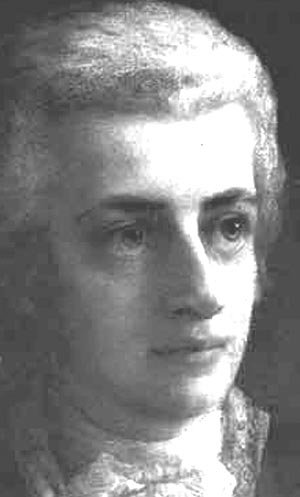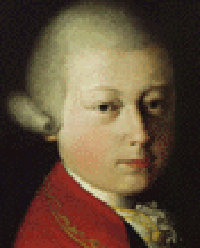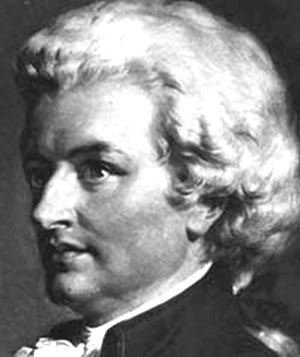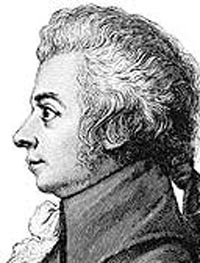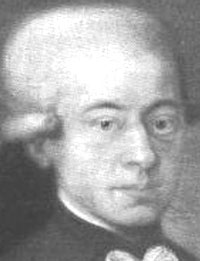Wolfgang Amadeus Mozart
Copyright Michael D. Robbins 2005
Astro-Rayological Interpretation & Charts
Quotes
Biography
Images and Physiognomic Interpretation
Wolfgang Amadeus Mozart—Composer, Musical Genius
January 27, 1756, Salzburg, Austria, 8:00 PM (Source: According to LMR, a letter from his father in a biography by J.G. Prodhomme) Died before 1:00 AM on December 6, 1791.
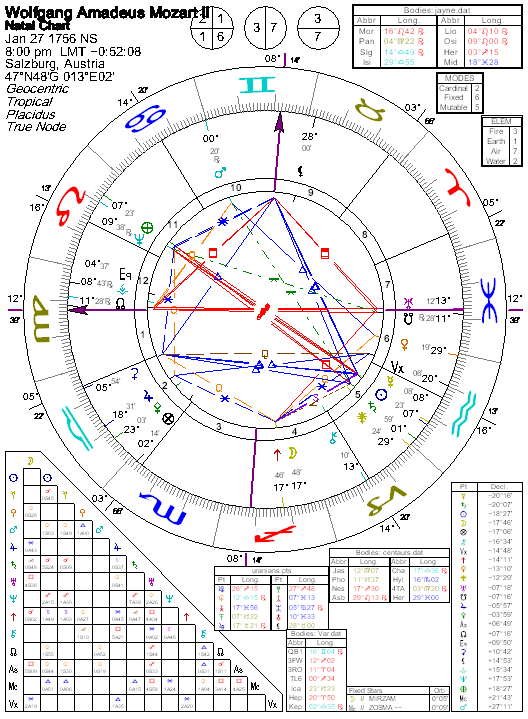
(Ascendant, Virgo; Sun, Mercury and Saturn all conjunct in Aquarius; Venus also in Aquarius; Moon conjunct Pluto in Sagittarius; Jupiter in Libra; Uranus in Pisces conjunct Descendant; Neptune in Leo)
The presence of the fourth ray, as Mozart’s soul ray, is indisputable. The Aquarian potential for genius and soul-telepathy is remarkably evident. Aquarius connected Mozart to the Universal Mind, and it was from that source that he “heard” much of his music which, in a manner of speaking, he simply transcribed. The refinement of his work and his keen musical discrimination are reflected in his Virgo Ascendant.
Esoterically, the fifth house represents the expression of soul talents, the contents of the causal body. Mozart’s Sun and Mercury are placed in H5 and demanding Saturn as well (in one sense, representing his father, who trained him in music and insisted upon his creativity and performance). It is also interesting to consider Jupiter in Libra in the second house. The second house is the ‘treasury’ of the soul, the contents of the causal body, indicating, esoterically, the ‘gifts’ which one has accumulated through lifetimes of effort. This Jupiter placement indicates that Mozart was inwardly ‘wealthy’. Jupiter trines the midpoint between the Mercury/Sun conjunction and the placement of Venus in the last degree of Aquarius.
The Pluto/Moon conjunction in Sagittarius in H4, indicate the “burning ground” which Mozart was treading. In this fire all obstacles to the expression of his genius were consumed. Uranus on the cusp of H7 indicate, esoterically, the awakening and transformative effect which he had upon those who experienced his music, and more mundanely, the instability of his interpersonal life. From yet another perspective, this placement can be understood as a Uranian ‘partnership’ with the triadal realm on inspiration, from which his beautiful and abundant ideas flowed. Pisces is one of the more musical signs .
The opposition of musical Neptune to his Sun, Mercury and even to Saturn, accentuate his receptivity and sensitivity. Neptune is also sextile to the MC, or his career point. His fourth ray soul found strong expression through the Neptune/Mercury opposition—Mercury being a planet of the fourth ray, and Neptune ruling the fourth, or buddhic, plane. The Virgo Ascendant is ruled by the fourth ray moon, placed in Sagittarius, a partially fourth ray sign, and in the fourth house. The Moon here is a veil for Neptune, especially (though Uranus cannot be discounted). The result is to bring heavenly music from ‘afar’ (Sagittarius) to the earth in the service of the fourth ray Ashram.
When thinking of Mozart’s chart the esoteric relations between Virgo and Aquarius become important: “Virgo hides the light which irradiates the world in Aquarius.” “Aquarius released Virgo from her load”. Through Mozart a great and heavenly gift came to birth and was distributed widely for all humanity.
I pay no attention whatever to anybody's praise or blame. I simply follow my own feelings.
It is a great consolation for me to remember that the Lord, to whom I had drawn near in humble and child-like faith, has suffered and died for me, and that He will look on me in love and compassion.
Neither a lofty degree of intelligence nor imagination nor both together go to the making of genius. Love, love, love, that is the soul of genius.
(Jupiter in Libra in 2nd house. Venus in Aquarius in 6th house.)Nevertheless the passions, whether violent or not, should never be so expressed as to reach the point of causing disgust; and music, even in situations of the greatest horror, should never be painful to the ear but should flatter and charm it, and thereby always remain music.
(Venus trine Mars)My great-grandfather used to say to his wife, my great- grandmother, who in turn told her daughter, my grandmother, who repeated it to her daughter, my mother, who used to remind her daughter, my own sister, that to talk well and eloquently was a very great art, but that an equally great one was to know the right moment to stop.
(Mercury conjunct Sun)As death, when we come to consider it closely, is the true goal of our existence, I have formed during the last few years such close relations with this best and truest friend of mankind, that his image is not only no longer terrifying to me, but is indeed very soothing and consoling! And I thank my God for graciously granting me the opportunity ... of learning that death is the key which unlocks the door to our true happiness.
(Pluto conjunct Moon)“When I am . . . traveling in a carriage, or walking after a good meal, or during the night when I cannot sleep; it is on such occasions that ideas flow best and most abundantly.”
“Nor do I hear in my imagination the parts successively, I hear them all at once. What a delight this is! All this inventing, this producing, takes place in a pleasing, lively dream.”
(Uranus in Pisces conjunct Descendant)“My subject enlarges itself, becomes methodized and define, and the whole, though it be long, stands almost complete and finished in my mind, so that I can survey it, like a fine picture or a beautiful statute, at a glance.”
"We say that the hour of death cannot be forecast, but when we say this we imagine that hour as placed in an obscure and distant future. It never occurs to us that it has any connection with the day already begun or that death could arrive this same afternoon, this afternoon which is so certain and which has every hour filled in advance." -
(Pluto conjunct Moon)"Do remember me to all my good friends, and do keep well and do not die, so that you may do another letter for me and that I may do another for you and that we may keep on doing until we are done. For I am the man to go on doing until there is nothing more to do." I do not hear in my imagination the parts successively, but I hear them gleich alles zusammen – at the same time all together.
Writing music is my one and only passion and joy.
I really do not aim at any originality.
Johannes Chrysostomus Wolfgangus Theophilus Mozart
Born January 27, 1756
Salzburg, (now Austria, then a principality of the Holy Roman Empire)
Died December 5, 1791
Vienna, Austria, Holy Roman Empire
Occupation(s) Composer
Pianist
Mozart was born to Leopold and Anna Maria Pertl Mozart, in the front room of nine Getreidegasse in Salzburg, the capital of the sovereign Archbishopric of Salzburg, in what is now Austria, then part of the Holy Roman Empire. His only sibling who survived beyond infancy was an older sister: Maria Anna, nicknamed Nannerl. Mozart was baptized the day after his birth at St. Rupert's Cathedral. The baptismal record gives his name in Latinized form as Joannes Chrysostomus Wolfgangus Theophilus Mozart. Of these names, the first two refer to John Chrysostom, one of the Church Fathers, and they were names not employed in everyday life. The fourth name, meaning "beloved of God" in Greek, was variously translated in Mozart's lifetime as Amadeus (Latin), Gottlieb (German), and Amadé (French). Mozart's father Leopold announced the birth of his son in a letter to the publisher Johann Jakob Lotter with the words "...the boy is called Joannes Chrysostomus, Wolfgang, Gottlieb". Mozart himself preferred to use the third name, and he also took a fancy to "Amadeus" over the years. (see Mozart's name).Mozart's father Leopold Mozart (1719–1787) was one of Europe's leading musical teachers. His influential textbook Versuch einer gründlichen Violinschule, was published in 1756, the year of Mozart's birth (English, as "A Treatise on the Fundamental Principles of Violin Playing", transl. E.Knocker; Oxford-New York, 1948). He was deputy Kapellmeister to the court orchestra of the Archbishop of Salzburg, and a prolific and successful composer of instrumental music. Leopold gave up composing when his son's outstanding musical talents became evident. They first came to light when Wolfgang was about three years old, and Leopold, proud of Wolfgang's achievements, gave him intensive musical training, including instruction in clavier, violin, and organ. Leopold was Wolfgang's only teacher in his earliest years. A note by Leopold in Nannerl's music book – the Nannerl Notenbuch – records that little Wolfgang had learned several of the pieces at the age of four. Mozart's first compositions, a small Andante (K. 1a) and Allegro (K. 1b), were written in 1761, when he was five years old.[1]
The years of travel
"Bologna Mozart" - Mozart age 21 in 1777, see also: face onlyDuring his formative years, Mozart made several European journeys, beginning with an exhibition in 1762 at the Court of the Elector of Bavaria in Munich, then in the same year at the Imperial Court in Vienna and Prague. A long concert tour spanning three and a half years followed, taking him and his father to the courts of Munich, Mannheim, Paris, London (where Wolfgang Amadeus played with the famous Italian cellist Giovanni Battista Cirri), The Hague, again to Paris, and back home via Zürich, Donaueschingen, and Munich. During this trip Mozart met a great number of musicians and acquainted himself with the works of other great composers. A particularly important influence was Johann Christian Bach, who met Mozart in London in 1764–65. Bach's work is often taken to be an inspiration for Mozart's music. They again went to Vienna in late 1767 and remained there until December 1768. On this trip Mozart contracted smallpox, and his healing was believed by Leopold as a proof of God's plans concerning the child.After one year in Salzburg, three trips to Italy followed: from December 1769 to March 1771, from August to December 1771, and from October 1772 to March 1773. Mozart was commissioned to compose three operas: Mitridate Rè di Ponto (1770), Ascanio in Alba (1771), and Lucio Silla (1772), all three of which were performed in Milan. During the first of these trips, Mozart met Andrea Luchesi in Venice and G.B. Martini in Bologna, and was accepted as a member of the famous Accademia Filarmonica. A highlight of the Italian journey, now an almost legendary tale, occurred when he heard Gregorio Allegri's Miserere once in performance in the Sistine Chapel then wrote it out in its entirety from memory, only returning to correct minor errors; thus producing the first illegal copy of this closely-guarded property of the Vatican.[2]
On September 23, 1777, accompanied by his mother, Mozart began a tour of Europe that included Munich, Mannheim, and Paris. In Mannheim he became acquainted with members of the Mannheim orchestra, the best in Europe at the time. He fell in love with Aloysia Weber, who later broke up the relationship with him. He was to marry her sister Constanze some four years later in Vienna. During his unsuccessful visit to Paris, his mother died in 1778.
Memorial plaque dedicated to Wolfgang Amadeus Mozart in Václavské námestí square in Olomouc (Czech Republic). Mozart in 1767 as an 11-year-old boy was fleeing from Vienna due to a smallpox epidemic and wrote his Sixth Symphony in F Major in Olomouc
In 1781, Idomeneo, regarded as Mozart's first great opera, premiered in Munich. The following year, he visited Vienna in the company of his employer, the harsh Prince-Archbishop Colloredo. When they returned to Salzburg, Mozart, who was then Konzertmeister, became increasingly rebellious, not wanting to follow the whims of the archbishop relating to musical affairs; and expressing these views, he soon fell out of the archbishop's favor. According to Mozart's own testimony, he was dismissed – literally – "with a kick in the arse".[3] Mozart chose to settle and develop his own freelance career in Vienna after its aristocracy began to take an interest in him.
On August 4, 1782, against his father's wishes, he married Constanze Weber (1763–1842), her name is also spelled "Costanze"; her father Fridolin was a half-brother of Carl Maria von Weber's father Franz Anton Weber. Although they had six children, only two survived infancy: Carl Thomas (1784–1858) and Franz Xaver Wolfgang (1791–1844; later a minor composer himself). Neither of these sons married or had children who reached adulthood. Carl did father a daughter, Constanza, who died in 1833.
The year 1782 was an auspicious one for Mozart's career: his opera Die Entführung aus dem Serail ("The Abduction from the Seraglio") was a great success, and he began a series of concerts at which he premiered his own piano concertos as director of the ensemble and soloist.
During 1782–83, Mozart became closely acquainted with the work of J.S. Bach and G.F. Handel as a result of the influence of Baron Gottfried van Swieten, who owned many manuscripts of works by the Baroque masters. Mozart's study of these works led first to a number of works imitating Baroque style and later had a powerful influence on his own personal musical language, for example the fugal passages in Die Zauberflöte ("The Magic Flute"), and in the finale of Symphony No. 41.
In 1783, Wolfgang and Constanze visited Leopold in Salzburg, but the visit was not a success, as his father did not open his heart to Constanze. However, the visit sparked the composition of one of Mozart's great liturgical pieces, the Mass in C Minor, which, though not completed, was premiered in Salzburg, and is now one of his best-known works. Wolfgang featured Constanze as the lead female solo voice at the premiere of the work, hoping to endear her to his father's affection.
In his early Vienna years, Mozart met Joseph Haydn and the two composers became friends. When Haydn visited Vienna, they sometimes played together in an impromptu string quartet. Mozart's six quartets dedicated to Haydn (K. 387, K. 421, K. 428, K. 458, K. 464, and K. 465) date from 1782–85, and are often judged to be his response to Haydn's Opus 33 set from 1781. In a letter to Haydn, Mozart wrote:
A father who had decided to send his sons out into the great world thought it his duty to entrust them to the protection and guidance of a man who was very celebrated at the time, and who happened moreover to be his best friend. In the same way I send my six sons to you... Please then, receive them kindly and be to them a father, guide, and friend!... I entreat you, however, to be indulgent to those faults which may have escaped a father's partial eye, and in spite of them, to continue your generous friendship towards one who so highly appreciates it." (Bernard Jacobson (1995) in CD no. 13 of the Best of the Complete Mozart Edition [Germany: Philips])
Haydn was soon in awe of Mozart, and when he first heard the last three of Mozart's series he told Leopold, "Before God and as an honest man I tell you that your son is the greatest composer known to me either in person or by name: He has taste, and, furthermore, the most profound knowledge of composition."[4]
During the years 1782–1785, Mozart put on a series of concerts in which he appeared as soloist in his piano concertos, widely considered among his greatest works. These concerts were financially successful. After 1785 Mozart performed far less and wrote only a few concertos. Maynard Solomon conjectures that he may have suffered from hand injuries [citation needed]; another possibility is that the fickle public ceased to attend the concerts in the same numbers.
Mozart was influenced by the ideas of the eighteenth-century European Enlightenment as an adult, and became a Freemason in 1784. His lodge was specifically Catholic, rather than deistic, and he worked fervently and successfully to convert his father before the latter's death in 1787. Die Zauberflöte, his second last opera, includes Masonic themes and allegory. He was in the same Masonic Lodge as Haydn.
Mozart's life was occasionally fraught with financial difficulty. Though the extent of this difficulty has often been romanticized and exaggerated, he nonetheless did resort to borrowing money from close friends, some debts remaining unpaid even to his death. During the years 1784-1787 he lived in a lavish, seven-room apartment, which may be visited today at Domgasse 5, behind St Stephen's Cathedral in Vienna; it was here, in 1786, that Mozart composed the opera Le nozze di Figaro.
[edit] Mozart and Prague
Mozart had a special relationship with the city of Prague and its people. The audience there celebrated the Figaro with the much-deserved reverence he was missing in his hometown Vienna. His quotation "Meine Prager verstehen mich" (My Praguers understand me) became very famous in the Bohemian lands. Many tourists follow his tracks in Prague and visit the Mozart Museum of the Villa Bertramka where they can enjoy a chamber concert. In the later years of his life, Prague provided Mozart with many financial resources from commissions [citation needed]. In Prague, Don Giovanni premiered on October 29, 1787 at the Theatre of the Estates. Mozart wrote La clemenza di Tito for the festivities accompanying Leopold II's coronation in November 1790; Mozart obtained this commission after Antonio Salieri had allegedly rejected it.[5]Final illness and death
Mozart's final illness and death are difficult topics for scholars, obscured by romantic stories and replete with conflicting theories. Scholars disagree about the course of decline in Mozart's health – particularly at what point (or if at all) Mozart became aware of his impending death and whether this awareness influenced his final works. The romantic view holds that Mozart declined gradually and that his outlook and compositions paralleled this decline. In opposition to this, some present-day scholars point out correspondence from Mozart's final year indicating that he was in good cheer, as well as evidence that Mozart's death was sudden and a shock to his family and friends. Mozart's attributed last words: "The taste of death is upon my lips...I feel something, that is not of this earth." The actual cause of Mozart's death is also a matter of conjecture. His death record listed "hitziges Frieselfieber" ("severe miliary fever," referring to a rash that looks like millet-seeds), a description that does not suffice to identify the cause as it would be diagnosed in modern medicine. Dozens of theories have been proposed, including trichinosis, influenza, mercury poisoning, rheumatic fever, and a rare kidney ailment. The practice of bleeding medical patients, common at that time, is also cited as a contributing cause.Mozart died at approximately 1 a.m. on December 5, 1791 in Vienna. With the onset of his illness, he had largely ceased work on his final composition, the Requiem some days earlier. Popular belief has it that Mozart was thinking of his own impending death while writing this piece, and even that a messenger from the afterworld commissioned it. Documentary evidence has established that the anonymous commission came from one Franz Count of Walsegg on Schloss Stuppach, and that most if not all of the music had been written while Mozart was still in good health. A younger composer, and Mozart's pupil at the time, Franz Xaver Süssmayr, was engaged by Constanze to complete the Requiem. He was not the first composer asked to finish the Requiem, as the widow had first approached another Mozart student, Joseph Eybler, who began work directly on the empty staves of Mozart's manuscript but then abandoned it.
Because he was buried in an unmarked grave, it has been popularly assumed that Mozart was penniless and forgotten when he died. In fact, though he was no longer as fashionable in Vienna as before, he continued to have a well paid job at court and receive substantial commissions from more distant parts of Europe, Prague in particular [citation needed]. He earned about 10,000 florins per year[6], equivalent to at least 42,000 US dollars in 2006, which places him within the top 5% of late 18th century wage earners[6], but he could not manage his wealth. His mother wrote, "When Wolfgang makes new acquaintances, he immediately wants to give his life and property to them." His impulsive largesse and spending often had him asking for loans. Many of his begging letters survive, but they are evidence not so much of poverty as of his habit of spending more than he earned. He was not buried in a "mass grave" but in a regular communal grave according to the 1784 laws in Austria.
Though the original grave in the St. Marx cemetery was lost, memorial gravestones (or cenotaphs) have been placed there and in the Zentralfriedhof. In 2005 new DNA testing was performed by Austria's University of Innsbruck and the US Armed Forces DNA Identification Laboratory in Rockville, Maryland, to determine if a skull in an Austrian Museum was actually his, using DNA samples from the marked graves of his grandmother and Mozart's niece. Test results were inconclusive, suggesting that none of the DNA samples was related to the others.
In 1809 Constanze married Danish diplomat Georg Nikolaus von Nissen (1761–1826). Being a fanatical admirer of Mozart, he (and Constanze?) edited vulgar passages out of many of the composer's letters and wrote a Mozart biography. Nissen did not live to see his biography printed, and Constanze finished it.
Rumours and controversies
Mozart is unusual among composers for being the subject of an abundance of misconceptions, partly because none of his early biographers knew him personally. Many rumours began soon after Mozart died, but few have any basis in fact; biographers often resorted to fiction in order to produce a work. An example is the story that Mozart composed his Requiem with the belief it was for himself. Sorting out fabrications from real events is a vexing and continuous task for Mozart scholars, mainly because of the prevalence of story in scholarship. Dramatists and screenwriters, free from responsibilities of scholarship, have found excellent material among these rumours.An especially popular case is the supposed rivalry between Mozart and Antonio Salieri, and, in some versions, the tale that it was poison received from the latter that caused Mozart's death; this is the subject of Aleksandr Pushkin's play Mozart and Salieri, Nicolai Rimsky-Korsakov's opera Mozart and Salieri, and Peter Shaffer's play Amadeus. The last of these has been made into a feature-length film of the same name. Shaffer's play attracted criticism for portraying Mozart as vulgar and loutish, a characterization felt by many to be unfairly exaggerated, but in fact frequently confirmed by the composer's letters and other memorabilia. For example, Mozart wrote canons on the words "Leck mich im Arsch" ("Lick me in the arse") and ";Leck mich im Arsch recht fein schön sauber" ("Lick me in the arse nice and clean") as party pieces for his friends. The Köchel numbers of these canons are 231 and 233.
Another debate involves Mozart's alleged status as a kind of superhuman prodigy, from childhood right up until his death. While some have criticised his earlier works as simplistic or forgettable, others revere even Mozart's juvenilia. In any case, several of his early compositions remain very popular. The motet Exultate, jubilate (K. 165), for example, composed when Mozart was seventeen years old, is among the most frequently recorded of his vocal compositions. It is also mentioned that around the time when he was five or six years old, he could play the piano blindfolded and with his hands crossed over one another. [citation needed]

